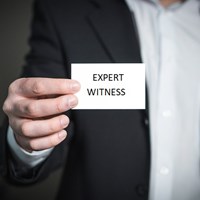Will the Proposed Amendments to Evidence Rule 702 Curb Unreliable Expert Testimony?
The admissibility of expert testimony in federal cases is governed by Evidence Rule 702. Rule 702 was last amended in 2000, seven years after Daubert v. Merrell Dow Pharms., Inc., 509 U.S. 579 (1993) was issued. Since 2000, there has been a divergence of opinion in applying Rule 702’s requirements. The Court’s “gatekeeping” role has not been implemented consistently across the Circuits. In particular, courts are not in agreement on which factors underpinning expert testimony go to the opinion’s weight or admissibility.
On August 6, 2021, the Judicial Conference Committee on Rules of Practice and Procedure approved the publication of the following proposed amendment to Rule 702 for public comment:
RULE 702: Testimony by Expert Witnesses
A witness who is qualified as an expert by knowledge, skill, experience, training, or education may testify in the form of an opinion or otherwise if the proponent has demonstrated by a preponderance of the evidence that:
- (a) the expert’s scientific, technical, or other specialized knowledge will help the trier of fact to understand the evidence or to determine a fact in issue;
- (b) the testimony is based on sufficient facts or data;
- (c) the testimony is the product of reliable principles and methods; and
- (d) the
expert has reliably appliedexpert’s opinion reflects a reliable application of the principles and methods to the facts of the case.
The amendments are meant to address: (1) the failure of certain courts to apply the preponderance of the evidence standard to the reliability requirement for expert testimony1; and (2) the problem of an expert overstating results “(for example, by stating an opinion as having a “zero error rate,” where that conclusion is not supportable by the methodology”2).
On the evidentiary standard, the Committee determined “that in a fair number of cases, the courts have found expert testimony admissible even though the proponent has not satisfied the Rule 702(b) and (d) requirements by a preponderance of the evidence.”3 The proposed language makes clear that the party offering the expert testimony has the burden of proving the opinion more likely than not satisfies the criteria in Rule 702.
The change to subsection (d) emphasizes that the court must consider the expert’s conclusion, not just the methodology purportedly used by the expert: “A testifying expert’s opinion must stay within the bounds of what can be concluded by a reliable application of the expert’s basis and methodology.” (emphasis added).4 If adopted, the language “clearly empowers the court to pass judgment on the conclusion that the expert has drawn from the metholology” consistent with the decision in General Electric Co., v. Joiner, 522 U.S. 136 (1997) (where Court declared trial court must consider not only whether the expert’s methodology is reliable, but whether such methodology was reliably applied).5
Comments to the proposed amendments are due by February 16, 2022. If adopted as proposed, the amendments should help curb the admissibility of ill-founded expert testimony that is cloaked in the guise of reliable science. It is not enough that an expert can cite well established methodologies in forming his or her opinion. Courts will need to analyze whether the expert actually reliably applied that methodology and the facts on which the opinion is based in coming to the expert’s conclusion. Given the excessive weight jurors frequently give expert testimony, ensuring the opinion is reliable is critical. Junk conclusions, like junk science, have no place in the courtroom. And while this may ultimately increase the cost of litigation when more expert challenges are filed and the opinion’s proponent is forced to prove that the testimony is more likely reliable than not, those costs are outweighed by the overall benefit to the justice system. Further, it may also reduce forum shopping if the changes bring more consistency across the Circuits on expert admissibility rulings. Time will tell.
1Preliminary Draft Proposed Amendments to the Federal Rules of Appellate, Bankruptcy, Civil, and Criminal Procedure and the Federal Rules of Evidence and August 6, 2021 Memo from Committee on Rules of Practice and Procedure, p. 298 (citing excerpts from the Report of the Advisory Committee on Evidence Rules (May 2021), which can be viewed here.
2Id. at 296.
3Id. at 297.
4Id.
5Id.


